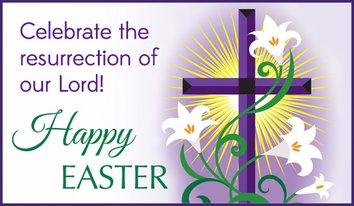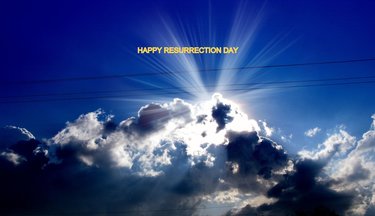
There are people, even some Christians, who say, and actually believe that Easter originated as a pagan festival or holiday, and for Christians to celebrate Easter is to celebrate with pagans. I for one believe, that even if Easter is celebrated on the same day as a pagan holiday (and it isn’t because Easter is not a pagan holiday) it doesn’t mean that Christians are celebrating what pagans are celebrating on the same day. My birthday, which is August 24th, as the birthday of the basketball great Reggie Miller and comedian Dave Chappelle My friends, family, and I celebrate my birthday on August 24th not the birthdays of those famous men.. Christians celebrate Easter as the day that Jesus Christ rose from the dead after three days, not some pagan god or goddess. Many Christians today, in addition to calling it Easter call the day Resurrection Day.
Easter is Christianity’s most important holiday. Christian churches in the West celebrate Easter on the first Sunday following the full moon after the vernal equinox on March 21, so Easter is observed anywhere between March 22 and April 25 every year. Orthodox Christians (The majority of Eastern Orthodox Christians live in Greece, eastern Europe, the Caucasus and Russia, with less numerous communities in the former Byzantine regions of the eastern Mediterranean, Africa and the Middle East. There are also many in other parts of the world, formed through immigration, conversion and missionary activity) use the Julian calendar to calculate when Easter will occur and typically celebrate the holiday a week or two after the Western churches, which follow the Gregorian calendar.
Easter is really an entire season of the Christian church year, as opposed to a single-day observance. Lent, the 40-day period leading up to Easter Sunday, is a time of reflection and penance and represents the 40 days that Jesus spent alone in the wilderness before starting his ministry, a time in which Christians believe he survived various temptations by the devil. The week before Easter is called Holy Week and includes Maundy Thursday, which commemorates Jesus’ last supper with his disciples; Good Friday, which honors the day of his crucifixion; and Holy Saturday, which focuses on the transition between the crucifixion and resurrection. The 50-day period following Easter Sunday is called Eastertide and includes a celebration of Jesus’ ascension into heaven. This 50 period ends with Pentecost (the Christian festival celebrating the descent of the Holy Spirit on the disciples of Jesus after his Ascension, held on the seventh Sunday after Easter).
Having said that let’s look at some of the arguments of those who say we shouldn’t celebrate Easter because of its pagan origins..
One argument for the pagan origins of Easter is based on a comment made by Venerable Bede (673-735), an English monk who wrote the first history of Christianity in England, and who is a major source of knowledge about early Anglo-Saxon culture. The problem with linking the Easter holiday with this goddess is that Anglo-Saxons didn’t come to Christianity until after 596 AD. Writing in the eighth century, Bede claimed the term Easter referred originally to a pagan holiday centered on the Anglo-Saxon goddess Eostre, celebrating both spring and fertility. In his writing he referred to a letter from Pope Gregory I. In this letter the pontiff suggested that missionary work among the heathens would improve if pagan holidays were synchronized with Christian celebrations.
These assertions lead to the widespread conclusion that the Christian holiday Easter had its origins in a pagan fertility rite. However there is evidence that Christians celebrated a Resurrection/Passover festival by the second century AD if not earlier.
Even if Christians did celebrate the resurrection of Christ on a day that pagans celebrated one of their gods or goddesses it in no way implied compromise. Christians around the world have sought to redeem the local culture for Christ while purging it of practices that are directly opposed or mutually incompatible to Christian belief, by pointing to the differences.
The article also says that “Easter wasn’t even mentioned by the apostles? And unheard of until a controversy took place well after the apostles were long since dead?” That is a true statement however the fact that Easter wasn’t mentioned by the apostles or early church didn’t mean that the resurrection of Jesus was not celebrated. On the contrary there is much evidence there in the New Testament that the Apostles, and early church started meeting on the first day of the week (Sunday) to worship and commemorate the Resurrection on a weekly basis.
John 20:19 (HCSB)19 In the evening of that first day of the week, the disciples were ⌊gathered together⌋ with the doors locked because of their fear of the Jews. Then Jesus came, stood among them, and said to them, “Peace to you!”
John 20:26 (HCSB)26 After eight days His disciples were indoors again, and Thomas was with them. Even though the doors were locked, Jesus came and stood among them. He said, “Peace to you!”
Acts 20:7 (HCSB)7 On the first day of the week, we assembled to break bread. Paul spoke to them, and since he was about to depart the next day, he extended his message until midnight.
1 Corinthians 16:1-2 (HCSB)1 Now about the collection for the saints: You should do the same as I instructed the Galatian churches.2 On the first day of the week, each of you is to set something aside and save in keeping with how he prospers, so that no collections will need to be made when I come.
Early Christian apologists Justin Martyr and Tertullian corroborate the celebration of Easter every Sunday in the Christian congregations of the second century. Eventually these weekly commemorations appear to have melded into one annual Easter celebration. Early Church father Irenaeus documented this annual celebration as he wrote against the dogmatic position of Bishop Victor of Rome, who demanded that Easter be affixed to only one day (Irenaeus favored a date that coincided with the Jewish Passover). - The Christian History and Development of Easter

Early Christians referred to Easter simply as Pascha. Pascha comes from both the Greek and Latin words for “Easter,” the holiday that celebrates the day Jesus Christ rose from the dead. The verbal form of this word, pascho in Greek, means “to suffer.” Originally, the Hebrew word pasach referred to the Passover feast that was celebrated during the same week Jesus was crucified. In the Jewish tradition, Passover is 8 days long, and celebrates the exodus of the Israelites from Egypt.
Easter eggs often looked down upon as pagan in origin may not be that at all. During the ancient practice of Lent, eggs were one of the forbidden foods. On Easter those prohibitions were lifted, and early Christians greeted each other with an egg as a gift. By the thirteenth century, these eggs were colored and decorated; in imperial Russia the egg custom was elevated to include precious objects decorated like eggs and adorned with jewels.
Conclusions
The evidence shows that neither the commemoration of Christ's death and resurrection or its name, Easter, originated in paganism. I agree that the commercialization of Easter dampens and skews its meaning and impact, but it doesn’t change the fact that Jesus did rise from the dead as the proof that God the Father accepted His sacrifice and blood on the cross as punishment for mankind’s sin. That’s what’s important.
Romans 3:23-26 (NLT)23 For everyone has sinned; we all fall short of God’s glorious standard.24 Yet God, with undeserved kindness, declares that we are righteous. He did this through Christ Jesus when he freed us from the penalty for our sins.25 For God presented Jesus as the sacrifice for sin. People are made right with God when they believe that Jesus sacrificed his life, shedding his blood. This sacrifice shows that God was being fair when he held back and did not punish those who sinned in times past,26 for he was looking ahead and including them in what he would do in this present time. God did this to demonstrate his righteousness, for he himself is fair and just, and he declares sinners to be right in his sight when they believe in Jesus.
Hebrews 9:27-28 (NLT)27 And just as each person is destined to die once and after that comes judgment,28 so also Christ died once for all time as a sacrifice to take away the sins of many people. He will come again, not to deal with our sins, but to bring salvation to all who are eagerly waiting for him.
1 John 2:1-2 (NLT)1 My dear children, I am writing this to you so that you will not sin. But if anyone does sin, we have an advocate who pleads our case before the Father. He is Jesus Christ, the one who is truly righteous.2 He himself is the sacrifice that atones for our sins—and not only our sins but the sins of all the world.
The Christian commemoration of Easter or Resurrection Day is not dependent on its name but on what it is --- which is, the remembrance of Christ's death and resurrection. It is Christ's victory over sin, death, and Satan.
Having said all this I say "Happy Easter!"

 RSS Feed
RSS Feed